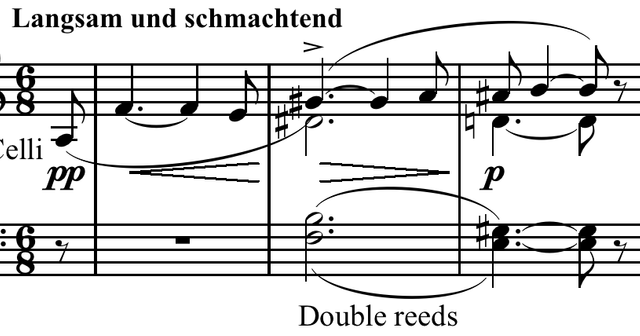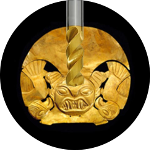Katharsisdrill recommends: Tristan and Isolde prelude to act I
One of the greatest musical pieces ever written both in scope, influence and just sheer awesomeness is Richard Wagner's prelude to the opera Tristan and Isolde. Not only is it a fabulous piece of music, it also inspired and initiated the very movement away from the tonal harmonic conventions it had taken the Europeans hundreds of years to invent.
For a very personal walk through of the opera you can read my post about the ending aria Isolde's Liebestod <- here. (Liebestod means lovedeath)
The ending, beautiful and perverse as it is, is still nothing compared to the opening.
The Tristan chord
The event happens already in the first bars of the prelude - where we first time hear the so called Tristan-chord. The event might be impossible to hear for a modern ear because tonal ambiguity as the one presented to us here is quite common and used in everything from modern symphonic music to horror film soundtracks. But you might notice a slight wrongness - as if something is slowly slipping in a wrong direction.
Below you can see the cello, bassoon and oboe voices performing the harmonic misdeed.

Throughout the slow and languorous piece this unresolved progression is repeated again and again as if the forbidden love of the protagonists are determined already. The strange chord is only resolved in the aria(that you can listen to in my old post - see link above) and therefore the opening ends in some muted pizzicato in the basses that goes right into the singing.
But the chord means much more than just the symbolic and dramatic implications because it is also the first real example on atonal composition in European music and being that it is the great grandmother of much of the new music that was written after. The oeuvre of Schönberg for example owes a lot to this exact piece.
For all its importance in music history it is also just a wonderful, sinister, wistful and dreamy piece of music. I hope you will give it a chance. Below are two recordings.


Hi @katharsisdrill,
Thank you for your commentary on "the Tristan chord." It's a surprising and interesting observation that horror movies may have changed the way that people perceive music in modern times. Thank you also for the embedded youtube videos. I enjoyed listening to the first, but still need to make time for the second.
We have shared your post on the Steemit's Best Classical Music Facebook page, and included it in our latest post, Steemit's Best Classical Music Roundup [Issue #12].
I do love Wagner's music, so powerful and emotive.
Yes! and inventive and original transcending all boundaries. Great art!
Good post
Thanks.